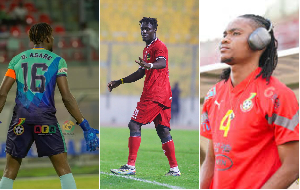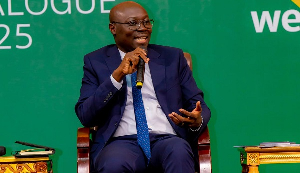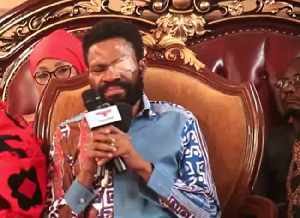Correspondence from Eastern Region:
Inhabitants of Oborpah, a farming community in the Lower Manya Krobo Municipal of the Eastern Region may not have much say in their choice of clean water for their day to day activities.
The water crisis facing the hundreds of residents who though are lucky to have six boreholes are far from over. This is because, the water pumped from the existing boreholes is not only unclean but also salty, does not lather, smells bad and therefore can’t be used by the residents.
They have alleged that despite several complaints to the local Assembly and Ghana Water Company Limited (GWCL) to fix pipelines in their communities to provide them with potable water, the issue has not been resolved.
As part of efforts to solve the problem, some operators of tricycles have taken it upon themselves to supply ‘clean’ water from a nearby pond to the residents for a fee.
The villagers in an interview with GhanaWeb, however, complained of buying the untreated, contaminated water for domestic use at Ghc1 per gallon which is too exorbitant considering the number of gallons a household needs in a day.
The fish infested pond lies about five kilometres away from Oborpah in a nearby village called Guata. From this pond, the operators of the tricycles fill several gallons with the untreated water and transport it to the community for sale at Ghc1 for a ‘Kufuor gallon.’
Dadematse of Oborpah, Moses Tetteh Agbertey said not much has been achieved in terms of providing potable water for the community despite his numerous efforts.
“We have the waterworks at nearby Oterkporlu which leads to the Central Region through Koforidua, we’re asking them to connect the water to our community and they’re telling us that there are rocks in the ground, what is called rocks?” he questioned.
The Dadematse who said the community could no longer tolerate the situation charged the GWCL and the Lower Manya Kroob Municipal Assembly to extend the water to the people as members of the community were ready to offer manual labour of digging the ground for the pipes to be laid.
“They should come and provide us with pipe-borne water. For now, we only rely on the untreated water sold to us which is also not clean,” said Moses Tetteh Agbertey.
Youth leader of the area, Abraham Tetteh Kwame also expressed regret about the situation.
“Our sources of water here is very bad, they are not drinkable. We can’t bath with it because it doesn’t lather. We buy the water we drink and wash with from a tractor [tricycle] at Ghc1 per gallon for drinking, washing, bathing, cooking, there are a number of boreholes here, none is good enough for us,” he said, ending with an appeal to authorities to assist them.
Assemblyman for Oborpah West, Teye Paul Angmor corroborated the plight of the community members.
Attributing the problem to the presence of limestone content in the soil, Mr Teye said efforts have been made to address the problem by applying chlorine into the soil.
However, he said the residents were still reluctant to drink the water due to its poor physical appearance.
“The boreholes have been repaired but the limestone content in the soil makes it oily and so the people are reluctant to drink it. They instead prefer to drink the untreated water they buy from Guata,” he said.
On why the residents’ appeal for an extension of pipe-borne water to the area has not been met, the Assembly Man said the GWCL explained that the number of residents in the community did not meet the number required for the extension of pipe-borne water to a community.
GhanaWeb met Francis Odjao, one of three operators who provide the untreated water, busily filling gallons with water at the pond side, ready to be transported to Oborpah.
From all indications, business is good for Odjao who is able to supply between 200 and 250 gallons of water for residents of Oborpah on a daily basis.
“We supply this water to the community for their household use, if we don’t supply this water, they don’t drink or wash. It’s like this is what serves them as their source of water because the water in their community is not ‘correct,’” he said.

Asked how many gallons he is able to supply in a day, he said: “In my own power, I’m able to supply about 200 or 250 gallons a day, selling a gallon for Ghc 1.”
Denying that the price is too expensive for the poor rural dwellers, Odjao said: “it’s not too expensive because of the difficulties of fetching and carrying the water and fuel the tricycle to the community, you even have to consider them.”
According to him, sometimes, he is forced to supply water for some community members even when he’s tired or unwell.
Despite his business interests, Odjao nevertheless appealed to government, NGOs and benevolent organizations to come on board and provide potable water facilities for the people of Oborpah.

Regional News of Saturday, 13 February 2021
Source: www.ghanaweb.com













